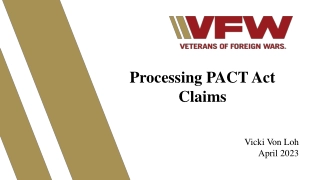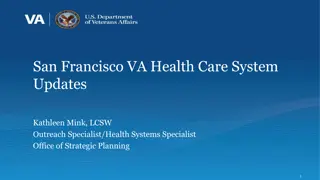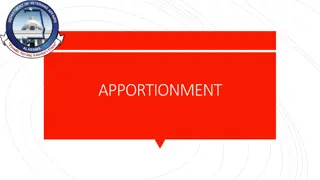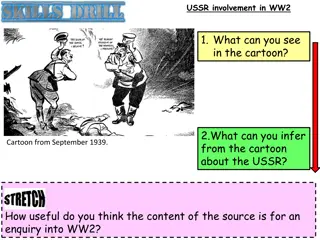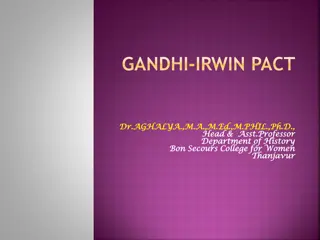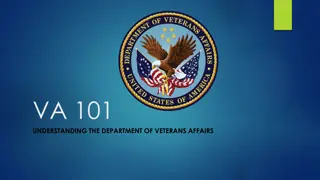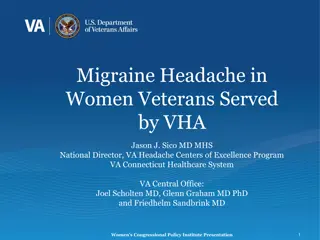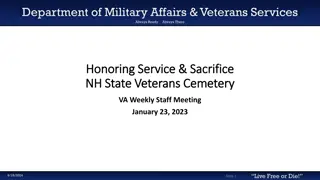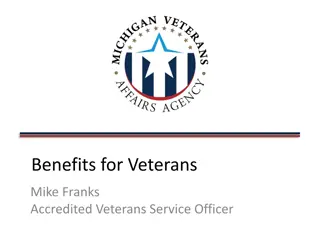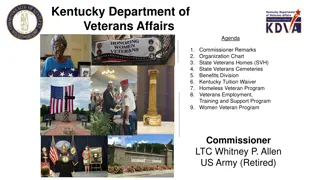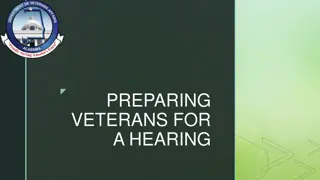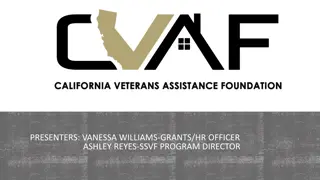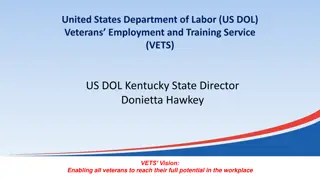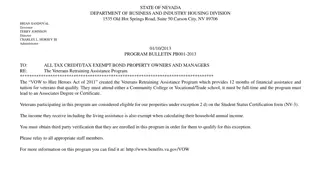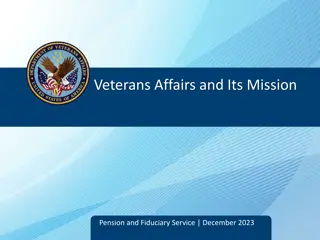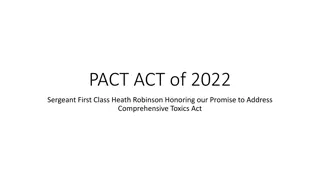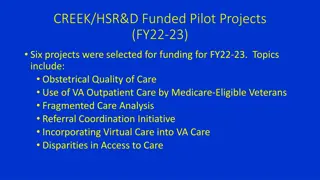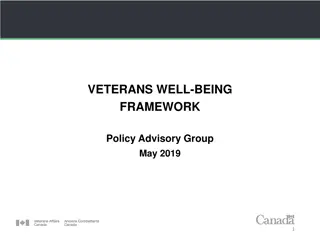Understanding The PACT Act and Its Impact on Veterans
The PACT Act, named after Sgt. First Class Heath Robinson who succumbed to lung cancer from toxic exposure, is a law enhancing VA benefits for veterans exposed to harmful substances. It expands VA health care eligibility, ensures toxic exposure screenings, and mandates research studies on veteran health trends. The Act also authorizes new medical facilities and provides crucial support to veterans and their families.
Download Presentation

Please find below an Image/Link to download the presentation.
The content on the website is provided AS IS for your information and personal use only. It may not be sold, licensed, or shared on other websites without obtaining consent from the author. Download presentation by click this link. If you encounter any issues during the download, it is possible that the publisher has removed the file from their server.
E N D
Presentation Transcript
The Sergeant First Class Heath Robinson Honoring our Promise to Address Comprehensive Toxics (PACT) Act The Sergeant First Class Heath Robinson Honoring our Promise to Address Comprehensive Toxics (PACT) Act commonly referred to as The PACT Act The new law is named for former Sgt. First Class Heath Robinson who died in 2020 after battling lung cancer for three years. Robinson s illness was attributed to smoke exposure from burning trash pits during his deployment to Iraq in 2006 and 2007.
The History of H.R 3967 Honoring our PACT Act of 2022 Introduced into the House on 6/17/2021 Reported to House, Part 1 2/22/2022 Passed House 3/3/2022 Passed Senate 6/16/2022 Signed into Law 8/10/2022
VFWs Role in The PACT Act Since the inception of the PACT Act, VFW s National Legislative Service has been working with lawmakers to bring about Toxic Exposure Reform. VFW deployed multiple Take Action campaigns through the VFW Action Corps to urge Americans to contact their senators and tell them to vote YES to the PACT Act. The Call to Action reached American Personality Jon Stewart who played an instrumental role in assisting with getting the PACT Act passed.
What is the PACT Act? The PACT Act is a new law that expands VA benefits and health care to veterans exposed to burn pits and other toxic substances. This law provides generations of veterans and their survivors with the care and benefits they ve earned and deserve.
The PACT Act and VA Health Care Ways the PACT Act expands VA Health care include: The Act expands and extends eligibility for VA health care for veterans with toxic- exposures and veterans of the Vietnam era, Gulf War era, and Post-9/11 era. VA will improve the decision-making process for determining what medical conditions will be considered for presumptive status. Every enrolled veteran in VHA will receive an initial toxic exposure screening and a follow-up screening every five years. Veterans who are not enrolled, but who are eligible to enroll, will have an opportunity to enroll and receive the screening.
The PACT Act and VA Health Care VA health care staff and claims processors will receive toxic exposure- related education and training. The Act requires research studies on the mortality of veterans who served in Southwest Asia during the Gulf War, Post-9/11 veteran health trends, and veteran cancer rates. The Act authorizes 31 new medical facilities across the country, providing greater access to VA health care.
The PACT Act and VA Health Care Enhanced Enrollment The PACT Act brought some changes to VHA enhanced enrollment, most notably: Enhanced Enrollment Eligibility for VA Healthcare for new veterans has been extended from 5 years to 10 years Open Enhanced Enrollment begins October 1, 2022, through October 1, 2023 *Special note: Enhanced Enrollment is Priority Group 6 within VHA.
The PACT Act and VA Health Care Eligibility for Enhanced Enrollment has been made for veterans who served in any of the following capacities: On or after August 2, 1990: Iraq, Kuwait, Bahrain, Oman, Qatar, Saudi Arabia, Somalia (new), or U.A.E. On or after September 11, 2001: Afghanistan, Djibouti, Egypt (new), Jordan (new), Lebanon (new), Syria, Yemen (new), or Uzbekistan, Any risk of exposure recorded in an exposure record tracking system, including ILER, Operations Iraqi Freedom, Enduring Freedom, New Dawn, Freedom s Sentinel, Inherent Resolve, or Resolute Support Mission, Any other location the VA Secretary determines is appropriate
The PACT Act and VA Health Care Permanent eligibility for VA care will be phased in over a 10-year period based on discharge date for each veteran serving in one or more of the specified locations: October 1, 2024 for veterans discharged between 8/2/1990 and 9/11/2001 October 1, 2026 for veterans discharged between 9/12/2001 and 12/31/ 2006 October 1, 2028 for veterans discharged between 1/1/2007 and 12/31/2012 October 1, 2030 for veterans discharged between 1/1/2013, and 12/31/2018 October 1, 2032 for all others who participated in any of the covered contingency operations. Permanent eligibility for VA care will begin October 1, 2032 for veterans who served in support of the listed operations but not in a specified location listed above.
The PACT Act and VA Presumptive Benefits The PACT Act has added more than 20 new presumptive conditions that veterans can file for if they meet the requirements. What is Presumptive Service Connection? VA presumes that certain disabilities were caused by military service. This is because of the unique circumstances of a specific veteran s military service. If a presumed condition is diagnosed in a Veteran within a certain group, they can be awarded disability compensation.
The PACT Act Presumptive Areas The PACT Act determined that veterans who served in any of the below locations on or after August 2, 1990 had exposure to burn pits or other toxins. We call this having a presumption of exposure. Bahrain Oman Somalia Iraq Qatar The United Arab Emirates (UAE) Kuwait Saudi Arabia **Includes the airspace above any of these locations
The PACT Act Presumptive Areas The PACT Act determined that veterans who served in any of the below locations on or after September 11, 2001 had exposure to burn pits or other toxins. We call this having a presumption of exposure. Afghanistan Jordan Uzbekistan Djibouti Lebanon Yemen Egypt Syria **Includes the airspace above any of these locations
The PACT Act Presumptive conditions for Gulf War and Post 9/11 Veterans Brain Cancer Glioblastoma Respiratory (Breathing-related) cancer of any type Gastrointestinal cancer of any type Head cancer of any type Lymphoma of any type Lymphatic cancer of any type Neck cancer Pancreatic Cancer Reproductive cancer of any type Kidney Cancer Melanoma Asthma (Diagnosed after service) Chronic Rhinitis Chronic Sinusitis Constrictive bronchiolitis Obliterative Bronchiolitis Emphysema Granulomatous disease Interstitial lung disease (ILD) Pleuritis Pulmonary Fibrosis Sarcoidosis Chronic Bronchitis Chronic Obstructive Pulmonary Disease (COPD)
The PACT Act Presumptive conditions for Vietnam Veterans and those exposed to Tactical Herbicides For Vietnam veterans and other veterans exposed to tactical herbicides, the PACT Act includes two Agent Orange presumptive conditions: Monoclonal gammopathy of undetermined significance (MGUS) High blood pressure (hypertension).
The PACT Act and When to File for VA Benefits VA is accepting claims NOW for service connection for the new presumptive conditions outlined in PACT ACT. VA is holding off on processing these claims until January 2023. If a veteran applies for one of the presumptive conditions and VA grants service connection, the effective date of the claim may be retroactive to August 10, 2022, the date the law went into effect, if the claim or Intent to File was filed within 1 year of the law s passing.
Filing a Claim When filing for a PACT Act Presumptive, follow this example of a 21-526EZ requesting service connection for Melanoma due to Toxic Exposure
Appealing previously Denied claims under the PACT Act If a veteran was previously denied service connection for one of the new presumptive conditions, they can appeal this decision by submitting two forms: VA Form 20-0995: Used to request a Supplemental Claim of a VA Rating Decision a veteran disagrees with VA Form 21-4138: Used as a statement in support of the claim being appealed on the 20-0995
Appealing previously Denied claims under the PACT Act When filing for an appeal of a previously denied PACT Act Presumptive, follow this example of a 20-0995 already filled in.
Appealing previously Denied claims under the PACT Act 21-4138 The other form needed is VA Form 21-4138 Statement in Support of Claim. When filling out this form for a previously denied claim include the following verbiage: (Veteran s Name) has previously filed a claim for (condition) and this claim was denied on (date) due to (reason for denial). (Veteran s name) served in (location) from (dates of service in that location) and is now eligible for presumptive service connection under the PACT Act of 2022. Please accept this statement in conjunction with the law change as new and relevant evidence and review the veteran s claim for (condition). Your attention in this matter is greatly appreciated.
The PACT Act and Dependency and Indemnity Compensation (DIC) Dependents wanting to submit a claim for DIC or accrued benefits under the Pact Act must first verify the veteran s cause of death is due to a presumptive condition. Things to consider when filing for a DIC Claim: Make sure the death certificate states the cause of death as one of the new PACT Act Presumptive conditions Direct and Secondary service-connection can be considered to qualify for DIC/accrued benefits The veteran did not need to file for the condition in the past. Entitlement to benefits can be established for survivors after the veteran s death. The application process has not changed to submit a DIC claim
Tort and 1151 claims & Receipt of VA Disability Benefits Questions are still being raised about how the Camp LeJeune water Lawsuit will interact with service connection for the new presumptive conditions. VA has not released guidance on how these two unique benefits will interact with each other. VFW s recommendation for veterans is to not officially sign anything regarding lawsuits until VA clarifies how the settlements will affect service-connected benefits and care. Though filing with the lawsuit may be the right choice for some veterans, it is too early in the process to agree with an attorney concerning Camp LeJeune lawsuits.
Assistance with filing a PACT Act Claim? If you or a loved one has been diagnosed with one of the presumptive conditions listed in this presentation, we invite you to contact the Veteran s of Foreign Wars to see if they qualify for service connection. The VFW has a worldwide network of professionally trained, accredited service officers standing by to assist you in obtaining the benefits you have earned. To find your local service officer visit: https://www.vfw.org/assistance/va-claims-separation-benefits


